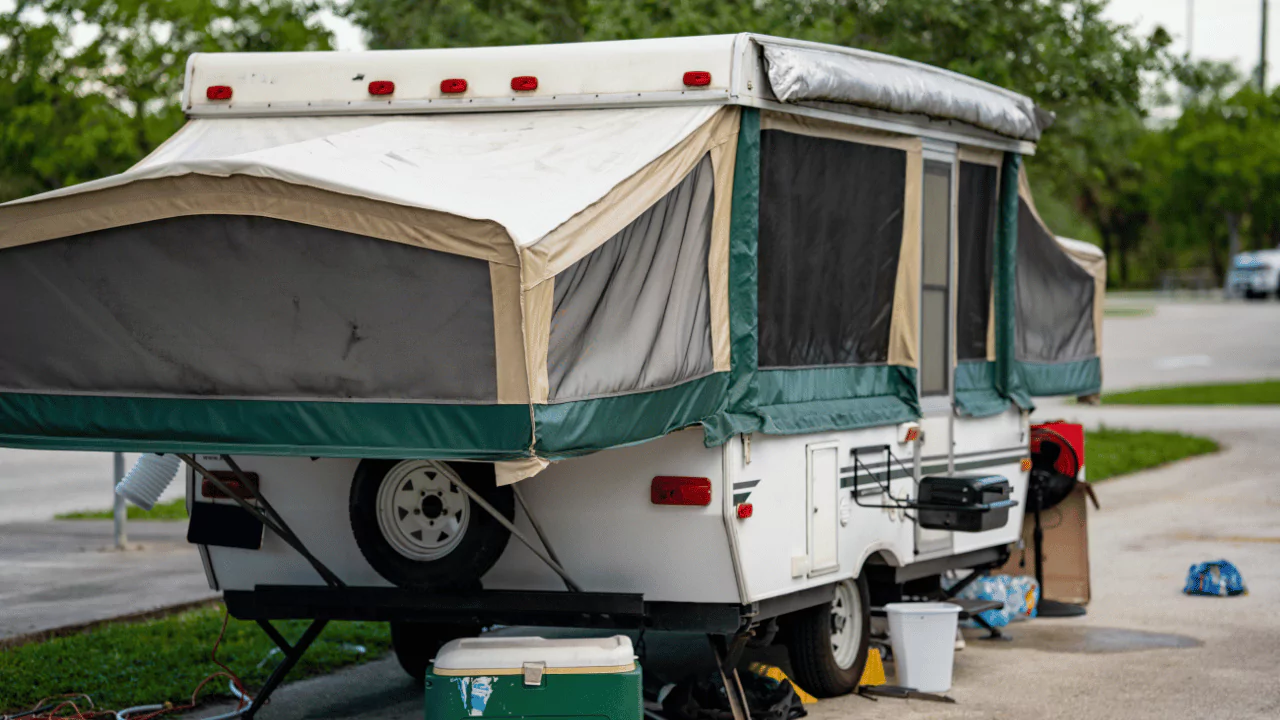Pop up campers, also known as folding campers or tent trailers, are a popular and affordable option for RV camping. Insuring a pop up camper protects you financially in the event of an accident, damage, or theft.
This article provides a comprehensive guide to pop up camper insurance, including liability coverage, additional insurance options, factors affecting cost, state requirements, and bundling policies.
Understanding Pop Up Camper Insurance
Liability Coverage from the Towed Vehicle
Liability insurance is the most important coverage for a pop up camper. When towing a trailer, liability insurance from your tow vehicle extends to cover any damage or injuries caused by the trailer while it’s attached. This includes both property damage and bodily injury liability. You’re required by law to carry at least the state minimum liability coverage on your tow vehicle.
However, liability coverage from your tow vehicle may not extend to a detached or unhitched trailer. It’s important to have liability coverage for the camper itself for times when it’s parked or detached from the tow vehicle.
Additional Insurance Options to Consider
In addition to liability, here are some other coverages to consider for a pop-up camper:
- Comprehensive – Covers damage from theft, vandalism, fire, hail, fallen trees, etc. This protects your camper when it’s parked.
- Collision – Covers damage to your camper from a collision or rollover when towing or parking.
- Uninsured motorist – Covers injuries to occupants of your camper if you’re hit by an uninsured driver.
- Full timers coverage – For those living in their camper full time. Provides coverage when the camper is detached.
- Emergency expense – Covers costs like hotels if the camper is damaged and unlivable.
- Accessories coverage – Protects any accessories like awnings, appliances, electronics, etc.
Factors That Affect The Cost of Insurance
The cost of insuring a pop up camper depends on several factors:
- Camper value – The more your camper is worth, the more insurance will cost to repair/replace it.
- Driver history – Your driving record, claims history, and driving experience impact premiums.
- Usage – Using a camper full time year-round costs more than occasional recreational use.
- Location – Insurance rates are higher if you live in urban areas or areas with extreme weather.
- Deductible – Choosing a higher deductible reduces your premiums.
- Discounts – Bundling policies, having safety features like alarms, being claim-free, etc. can reduce costs.
State Requirements for Pop Up Camper Insurance
States that require insurance
Very few states require insurance specifically for pop up campers. However, all states require liability insurance for tow vehicles. Some states also require personal injury protection and uninsured motorist coverage as part of your auto policy. When towing a camper, your state’s auto insurance minimums apply.
Insurance Requirements for Different Types of Campers
Larger travel trailers and motorhomes are treated differently than pop-up campers in some states. For example:
- Some states require separate registration and plates for trailers over a certain size/weight. This may necessitate getting specific insurance.
- Many states have different requirements for motorhomes, especially regarding minimum liability coverage. Make sure you meet state minimums.
- If you permanently reside in your RV full-time or park it on your property, homeowner’s insurance may be required.
The requirements vary by state, so check your specific regulations for the type of camper you own.
Bundling Pop Up Camper Insurance
The Benefits of Bundling your Camper and Car insurance
The easiest way to get coverage for a pop up camper is to add it to an existing auto insurance policy. Bundling camper insurance with your car insurance provides these benefits:
- It’s more convenient to have a single policy for both vehicles.
- You only deal with one deductible if both vehicles are damaged.
- Bundling can qualify you for multi-policy or multi-vehicle discounts.
- You have a single point of contact for managing the policy and filing claims.
Options for Bundling Insurance Policies
If you don’t want to bundle with your auto insurer, here are some other options:
- Bundle with your home or renter’s insurance if it’s from a different provider.
- Get a specialty RV insurance policy that covers both the tow vehicle and camper.
- Insure vehicles separately but with the same insurance company to get multi-policy discounts.
The best option depends on your particular vehicle, driving patterns, and insurance costs. Shop around to find the most affordable bundled or multi-policy quotes.





